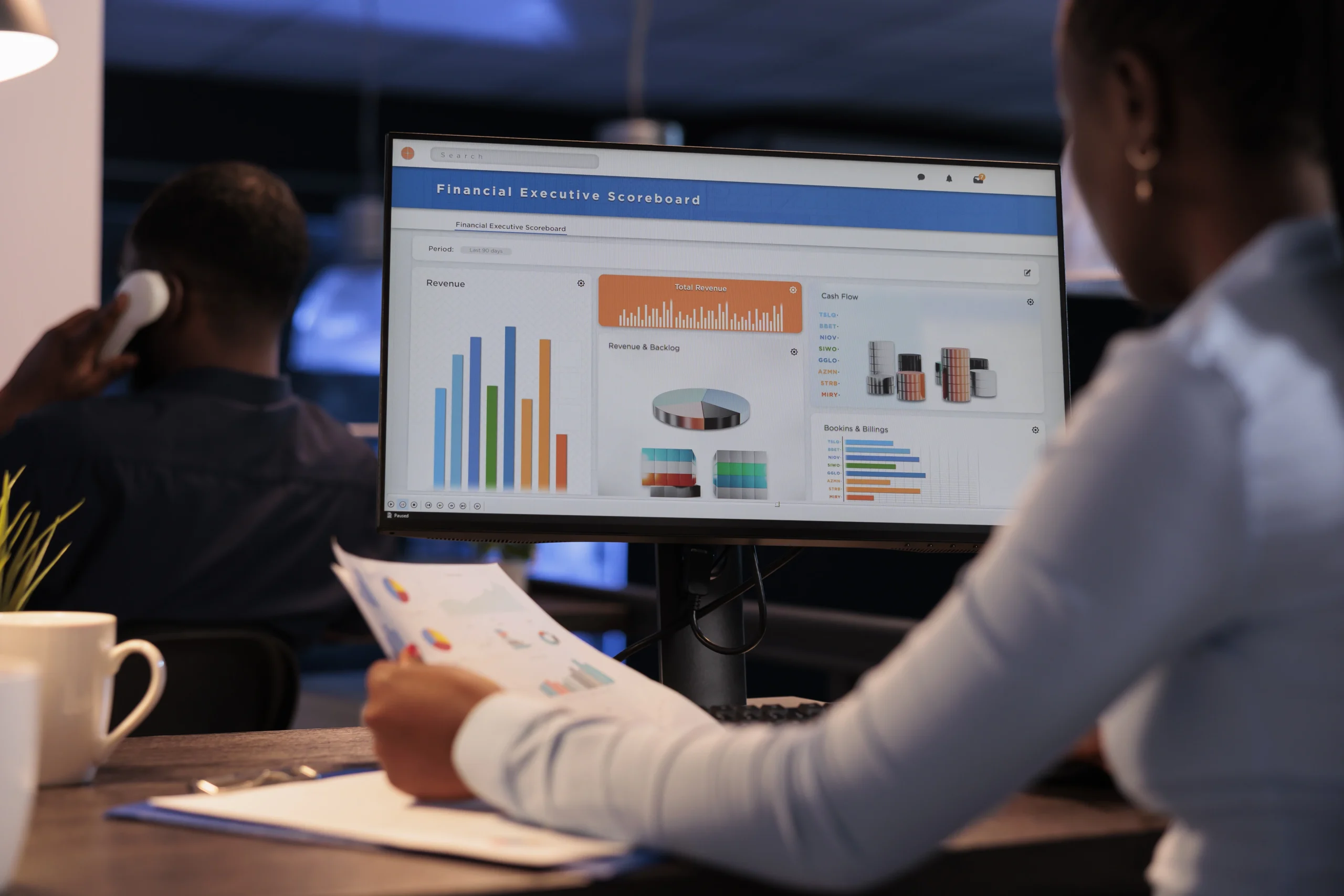Table of Contents
ToggleCustom reporting is the process of designing reports tailored to the specific needs of a business. Unlike standard reports that follow fixed templates, custom reporting offers flexibility in structure, visualizations, and data sources.
At Tri-Link FTZ, we’ve seen firsthand how this capability empowers businesses to extract actionable insights from complex logistics data. Whether tracking supply chain efficiency or monitoring compliance with trade regulations, custom reporting transforms raw data into a strategic asset.
Imagine being able to compare the performance of different supply chain routes in real time or identifying bottlenecks in your fulfillment process with precision. This is the power of custom reporting—it gives you the tools to see beyond the obvious and make data-driven decisions confidently.

As a third-party logistics provider with decades of experience, I’ve learned that no two clients are alike. Each has unique challenges, from tracking international shipments to managing duty deferment in foreign trade zones.
Custom reporting bridges this gap by adapting to the specific needs of each business. For instance, a client in the electronics industry might need detailed reports on tariff exemptions, while a retail client requires real-time visibility into inventory turnover.
Custom reporting ensures both get exactly what they need without wading through irrelevant data. By focusing on the metrics that matter, businesses can improve operational efficiency, reduce costs, and stay ahead of industry trends. To read more click here.
Effective custom reporting tools share a few common characteristics that make them indispensable. First, they must be user-friendly.
Logistics teams are often busy juggling multiple priorities, and a complicated interface can slow down productivity. At Tri-Link FTZ, we prioritize tools that simplify report creation, enabling teams to focus on decision-making rather than wrestling with software.
Integration capabilities are another critical feature. A robust tool should seamlessly connect with systems like warehouse management software (WMS), enterprise resource planning (ERP) systems, or customer relationship management (CRM) platforms.
This ensures that data flows smoothly across platforms, creating a unified view of operations. Security is also paramount, especially when handling sensitive trade data.
Advanced encryption and role-based access controls protect client information while ensuring compliance with regulations. Lastly, visualization is key.
Custom reporting tools should offer a variety of charts, graphs, and tables that make complex data easy to understand. At Tri-Link FTZ, we use tools that allow clients to customize dashboards with KPIs specific to their industry, helping them visualize trends at a glance.
In logistics, key performance indicators (KPIs) are the backbone of strategic decision-making. From on-time delivery rates to customs clearance efficiency, KPIs provide a snapshot of operational health.
Custom reporting takes this a step further by allowing businesses to drill down into the data that drives these metrics. Take, for example, a KPI like warehouse throughput.
A standard report might tell you how many units were processed in a week. A custom report, however, can break this down by product category, time of day, or even labor shifts.
This level of detail enables managers to identify inefficiencies and implement targeted improvements. At Tri-Link FTZ, we’ve used custom reports to help clients optimize everything from inventory placement to shipping schedules, significantly improving their bottom line.

Standard reporting systems often fall short in the fast-paced world of logistics. They lack flexibility, fail to integrate with existing systems, and don’t offer the granularity needed for strategic decisions.
These limitations can lead to wasted resources, missed opportunities, and compliance risks. Custom reporting solves these problems by offering tailored solutions.
For instance, we’ve helped clients struggling with data silos integrate their systems through custom reporting, enabling seamless data sharing across departments. By automating repetitive tasks like generating daily compliance updates, we’ve also freed up teams to focus on strategic priorities.
These solutions not only save time but also ensure that every report is relevant, actionable, and aligned with business goals.
At Tri-Link FTZ, we serve a diverse range of industries, each with unique reporting needs. Some of the sectors that benefit most from custom reporting include:
Each of these industries leverages custom reporting to gain a competitive edge, reduce inefficiencies, and navigate regulatory landscapes with ease. To read more click here.
Implementing custom reporting tools requires careful planning and execution. At Tri-Link FTZ, we guide clients through every step of the process, from defining objectives to training end-users.
The first step is to understand what you want to achieve. Are you looking to improve operational efficiency, enhance compliance, or gain better insights into customer behavior?
Defining these goals ensures the reports are aligned with your strategic priorities. Next, we focus on data integration.
Custom reporting is most effective when it pulls data from multiple sources, creating a comprehensive view of operations. Our team works to ensure seamless integration with existing systems, minimizing disruptions during implementation.
Finally, we emphasize training and support. A well-trained team is essential for maximizing the value of custom reporting tools, and our experts are always on hand to provide guidance

One of the most powerful aspects of custom reporting is its ability to support real-time decision-making. In the dynamic world of logistics, being able to react quickly to changing conditions can mean the difference between success and failure.
Custom dashboards that update in real time provide instant visibility into critical metrics like delivery delays, inventory levels, or customs compliance. For example, one of our clients used custom reporting to monitor real-time data on international shipments.
When a delay was detected at a port, the system automatically flagged the issue, allowing the client to reroute shipments and minimize disruptions. This level of agility is only possible with a robust custom reporting solution.
Custom reporting offers a wealth of actionable insights that can transform operations. Here are a few examples from our experience at Tri-Link FTZ:
Each of these insights has helped our clients streamline operations, reduce costs, and achieve their business goals.
Selecting the right custom reporting tool is critical for success. At Tri-Link FTZ, we evaluate solutions based on their scalability, integration capabilities, and ease of use.
We also consider the level of support provided by the vendor, as this can make a significant difference during implementation. Cost is another important factor.
While custom reporting tools can represent a significant investment, the ROI they deliver in terms of efficiency, compliance, and decision-making often far outweighs the initial expense. By carefully evaluating these factors, businesses can choose a solution that meets their needs and delivers long-term value.

To get the most out of custom reporting, it’s essential to follow best practices. Start by regularly updating your reports to ensure they reflect current business conditions.
Use intuitive visualizations to make data more accessible, and automate repetitive tasks to save time. At Tri-Link FTZ, we also emphasize the importance of data validation and governance.
Ensuring your data is accurate and consistent is the foundation of effective reporting. Finally, involve your team in the reporting process.
By gathering input from stakeholders, you can ensure the reports meet their needs and foster a culture of data-driven decision-making.
Implementing custom reporting tools requires an upfront investment, but the long-term benefits often justify the cost. At Tri-Link FTZ, we’ve helped clients understand how to weigh these costs against the efficiency and insights gained.
Initial expenses typically include licensing fees, integration costs, and training. These are necessary to ensure that the tool fits seamlessly into your operations and that your team can use it effectively.
Ongoing costs such as maintenance and updates should also be factored in. However, custom reporting solutions often save money by reducing the time spent on manual data processing and preventing costly errors.
For example, one client saved thousands annually by automating compliance reporting, freeing their team to focus on strategic projects. When evaluating cost, it’s crucial to consider the ROI, which can include improved decision-making, enhanced compliance, and operational efficiencies.
Data security is a top priority for businesses using custom reporting tools, especially in the logistics and foreign trade zone sectors. At Tri-Link FTZ, we handle sensitive client data daily, making it essential to implement robust security measures.
Custom reporting solutions should include role-based access controls to ensure that only authorized personnel can view or edit reports. Encryption, both during data transmission and at rest, is another critical feature.
Compliance with regulations such as GDPR or CCPA is non-negotiable. Custom reporting tools should provide audit trails and reporting features that make it easy to demonstrate compliance.
For example, we worked with a client in the healthcare sector to ensure their reports aligned with HIPAA requirements, giving them confidence in their data security practices. These measures not only protect sensitive information but also build trust with clients and stakeholders.
The field of custom reporting is evolving rapidly, with new technologies enhancing its capabilities. At Tri-Link FTZ, we’ve seen firsthand how innovations like AI and machine learning are transforming reporting.
These technologies can analyze vast datasets to identify trends and make predictions, adding a layer of intelligence to traditional reports. For example, predictive analytics can help businesses forecast demand or identify potential supply chain disruptions before they occur.
Interactive dashboards are another game-changer. Features like drill-down capabilities and real-time updates make it easier for users to explore data and gain deeper insights.
Additionally, cloud-based reporting solutions are becoming the norm, offering scalability and collaboration tools that traditional systems can’t match. Businesses can now access their reports from anywhere, ensuring they’re always informed and ready to act.
Custom reporting is more than just a tool—it’s a strategic asset that empowers businesses to unlock the full potential of their data. From improving decision-making to enhancing compliance and operational efficiency, its benefits are far-reaching.
At Tri-Link FTZ, we’ve spent over 35 years helping businesses navigate the complexities of logistics and foreign trade zones. Custom reporting has been a cornerstone of our success, enabling our clients to achieve their goals with precision and confidence.
Whether you’re looking to streamline operations, gain insights into KPIs, or stay ahead of industry trends, custom reporting is the key to making data work for you. If you’re ready to take the next step, contact us today to learn how we can help you harness the power of custom reporting for your business.
Share this article
We have other resources available upon request as well as one-on-one support and personalized answers, just like our services.
Simply contact us anytime and we’ll get back to you to answer your questions and provide meaningful answers that show you how Tri-Link supports your logistics, reduces costs, and accelerates efficiency.
Tri-Link delivers exceptional FTZ and 3PL services tailored to your global trade needs.
Our solutions combine innovation, quality, and efficiency to exceed your expectations and meet your specific requirements.